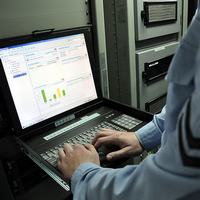In the past few years, concerns over the growing risk of cyber warfare have been supplemented by evidence of actual cyber attacks, many likely launched with the aid of nation-states. When the United States sounds the alarm on cyber malfeasance, disruption or espionage, China or Russia are typically "the usual suspects." It's interesting, then, that a delegation of Russian officials, led by Gen. Vladislav Sherstyuk, visited Washington in November for meetings with officials of the National Security Council and the Departments of Defense, State and Homeland Security.
Currently a deputy secretary of the Russian Security Council, Sherstyuk was identified by Jane's as Russia's "eavesdropper-in-chief" more than a decade ago. Beginning with his recruitment by the KGB in 1966, Sherstyuk's career in intelligence went on to include positions in Soviet communications and signals intelligence. After the breakup of the Soviet Union, he landed at -- and eventually ran -- FAPSI, the signals intelligence operation spun off from the KGB and later reincorporated into its successor agency, Russia's FSB. Sherstyuk stayed on at FAPSI until 1999, before moving over to his post on the Security Council. A Moscow State University physicist with experience in radio, cryptography and computing, Sherstyuk is a logical choice to head up a cyber-security negotiating team for the Russians. But what did Russia send him to Washington to achieve?
Press coverage of Sherstyuk's visit speculated that, in addition to holding talks on the further reduction of their aging nuclear arsenals, the United States and Russia are finally talking about both arms control regarding cyber weapons and additional cooperation on cyber crime. Certainly the need for such an accord exists. Although near-ancient history in the world of cyber conflict, the electronic attacks against Estonia in April-May 2007 gave a strong indication of Russia's offensive cyber capabilities. Russia never actually admitted to involvement in that incident, but there is enough data from the following summer's war with Georgia to conclude that cyber attacks were indeed employed as part of the broad spectrum of military tools unleashed against Tbilisi. Taken in tandem, these two episodes constitute reasonable evidence that Russia has employed cyber capabilities to assert influence beyond its borders.

